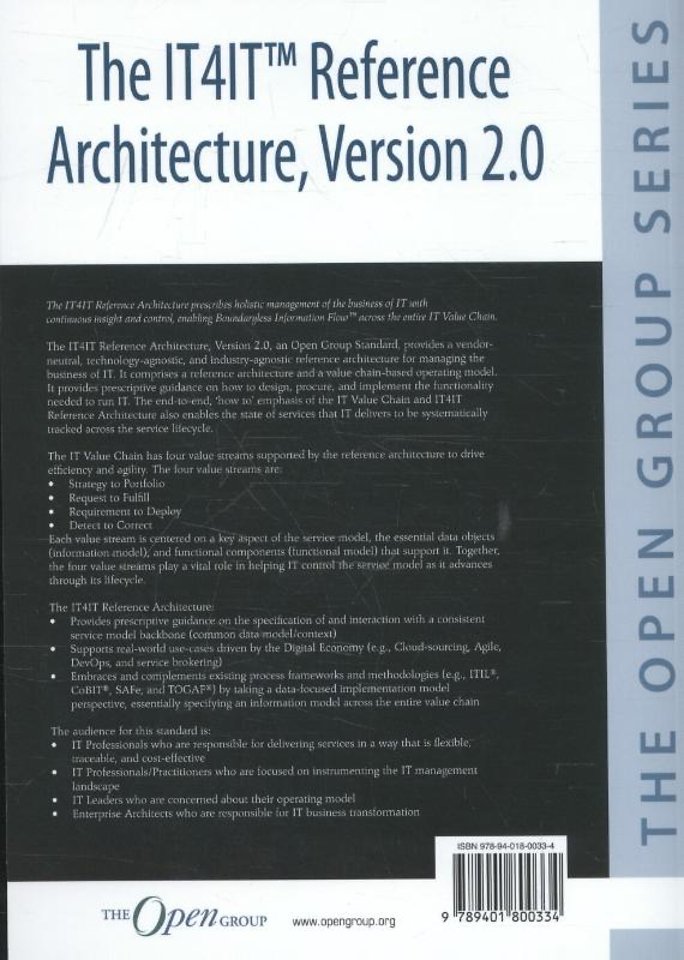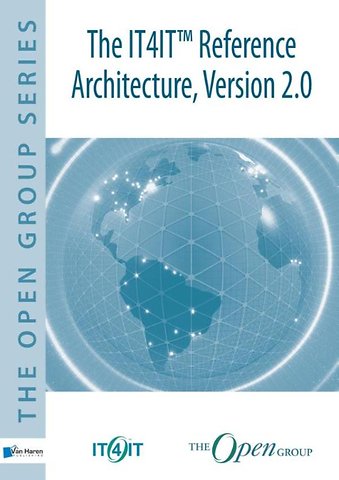



The Open Group works with customers and suppliers of technology products and services, and with consortia and other standards organizations to capture, clarify, and integrate current and emerging requirements, establish standards and policies, and share best practices. Our standards ensure openness, interoperability, and consensus.
Meer over The Open GroupThe IT4IT™ Reference Architecture
E-book Pdf met watermerkbeveiliging Engels 2016 9789401805971Samenvatting
The Open Group IT4IT™ Reference Architecture, Version 2.0, an Open Group Standard, provides a vendor-neutral, technology-agnostic, and industry-agnostic reference architecture for managing the business of IT.
The Open Group IT4IT Reference Architecture standard comprises a reference architecture and a value chain-based operating model.
The IT Value Chain has four value streams supported by a reference architecture to drive efficiency and agility. The four value streams are:
• Strategy to Portfolio
• Request to Fulfill
• Requirement to Deploy
• Detect to Correct
Each IT Value Stream is centered on a key aspect of the service model, the essential data objects (information model), and functional components (functional model) that support it. Together, the four value streams play a vital role in helping IT control the service model as it advances through its lifecycle.
The IT4IT Reference Architecture:
• Provides prescriptive guidance on the specification of and interaction with a consistent service model backbone (common data model/context)
• Supports real-world use-cases driven by the Digital Economy (e.g., Cloud-sourcing, Agile, DevOps, and service brokering)
• Embraces and complements existing process frameworks and methodologies (e.g., ITIL®, CoBIT®, SAFe, and TOGAF®) by taking a data-focused implementation model perspective, essentially specifying an information model across the entire value chain
The audience for this standard is:
• IT Professionals who are responsible for delivering services in a way that is
flexible, traceable, and cost-effective
• IT Professionals / Practitioners who are focused on instrumenting the IT
management landscape
• IT Leaders who are concerned about their operating model
• Enterprise Architects who are responsible for IT business transformation
Topics covered include:
• An introduction to the standard and the purpose of the IT4IT work
• Key terminology of the standard
• An introduction for executives and others introducing the IT Value Chain and IT4IT Reference Architecture concepts
• IT4IT Core, which defines the structure of the IT4IT standard as well as the process and document structure used by the IT4IT standard
• The Strategy to Portfolio (S2P) Value Stream
• The Requirement to Deploy (R2D) Value Stream
• The Request to Fulfill (R2F) Value Stream
• The Detect to Correct (D2C) Value Stream
• Background information on the standard.
Trefwoorden
Specificaties
Lezersrecensies
Inhoudsopgave
1.1 Objective
1.2 Overview
1.3 Conformance
1.4 Normative References
1.5 Terminology
1.6 Future Directions
2. Definitions
2.1 Service Lifecycle Data Object (Data Object)
2.2 IT Value Chain
2.3 Value Chain
2.4 Value Stream
2.5 Functional Component
2.6 Service Model Backbone Data Object
2.7 Relationship
2.8 System of Record
3. Overview
3.1 What is the IT Value Chain?
3.2 IT Value Chain and IT4IT Reference Architecture
3.3 IT Value Streams
3.3.1 Strategy to Portfolio
3.3.2 Requirement to Deploy
3.3.3 Request to Fulfill
3.3.4 Detect to Correct
3.4 IT4IT Reference Architecture
3.4.1 Service Model
3.4.2 Information Model
3.4.3 Functional Model
3.4.4 Integration Model
4. IT4IT Core
4.1 Introduction
4.2 IT4IT Abstraction Levels and Class Structure
4.2.1 IT4IT Abstractions
4.2.2 Concepts at Level 1: End-to-End Overview
4.2.3 Level 1 Reference Architecture Model
4.2.4 Concepts at Level 2: Value Stream Documentation
4.2.5 Level 2 Reference Architecture Diagram (Example)
4.2.6 Concepts at Level 3: Vendor-Independent Architecture
4.2.7 Level 3 Reference Architecture Diagram (Example)
4.2.8 Concepts at Levels 4 and 5 –Vendor Extensions
5. Strategy to Portfolio (S2P) Value Stream
5.1 Objectives
5.2 Business Value Proposition
5.3 Key Performance Indicators
5.4 Value Stream Definition
5.4.1 Enterprise Architecture Functional Component
5.4.2 Policy Functional Component
5.4.3 Proposal Functional Component
5.4.4 Portfolio Demand Functional Component
5.4.5 Service Portfolio Functional Component
5.4.6 IT Investment Portfolio Auxiliary Functional Component
6. Requirement to Deploy (R2D) Value Stream
6.1 Objectives
6.2 Business Value Proposition
6.3 Key Performance Indicators
6.4 Value Stream Definition
6.4.1 Project Functional Component
6.4.2 Requirement Functional Component
6.4.3 Service Design Functional Component
6.4.4 Source Control Functional Component
6.4.5 Build Functional Component
6.4.6 Build Package Functional Component
6.4.7 Release Composition Functional Component
6.4.8 Test Functional Component
6.4.9 Defect Functional Component
7. Request to Fulfill (R2F) Value Stream
7.1 Objectives
7.2 Business Value Proposition
7.3 Key Performance Indicators
7.4 Value Stream Definition
7.4.1 Engagement Experience Portal (Secondary Functional Component)
7.4.2 Offer Consumption Functional Component
7.4.3 Offer Management Functional Component
7.4.4 Catalog Composition Functional Component
7.4.5 Request Rationalization Functional Component
7.4.6 Fulfillment Execution Functional Component
7.4.7 Usage Functional Component
7.4.8 Chargeback/Showback Functional Component
7.4.9 Knowledge & Collaboration Supporting Function
8. Detect to Correct (D2C) Value Stream
8.1 Objectives
8.2 Business Value Proposition
8.3 Key Performance Indicators
8.4 Value Stream Definition
8.4.1 Service Monitoring Functional Component
8.4.2 Event Functional Component
8.4.3 Incident Functional Component
8.4.4 Problem Functional Component
8.4.5 Change Control Functional Component
8.4.6 Configuration Management Functional Component
8.4.7 Diagnostics & Remediation Functional Component
8.4.8 Service Level Functional Component
8.4.9 Other IT Operations Areas
A: Rationale (Informative)
A.1 Introduction
A.2 Definitions
A.3 Overview
A.3.1 Business Drivers for an Improved IT Operating Model
A.3.2 The IT Value Chain
A.4 IT4IT Core
A.4.1 Value Streams
A.4.2 Functional Components
A.5 Strategy to Portfolio Value Stream
A.5.1 Related Standards, Frameworks, and Guidance
A.6 Requirement to Deploy Value Stream
A.6.1 Related Standards, Frameworks, and Guidance
A.7 Request to Fulfill Value Stream
A.7.1 Related Standards, Frameworks, and Guidance
A.8 Detect to Correct Value Stream
A.8.1 Related Standards, Frameworks, and Guidance
Anderen die dit kochten, kochten ook
Rubrieken
- advisering
- algemeen management
- coaching en trainen
- communicatie en media
- economie
- financieel management
- inkoop en logistiek
- internet en social media
- it-management / ict
- juridisch
- leiderschap
- marketing
- mens en maatschappij
- non-profit
- ondernemen
- organisatiekunde
- personal finance
- personeelsmanagement
- persoonlijke effectiviteit
- projectmanagement
- psychologie
- reclame en verkoop
- strategisch management
- verandermanagement
- werk en loopbaan





